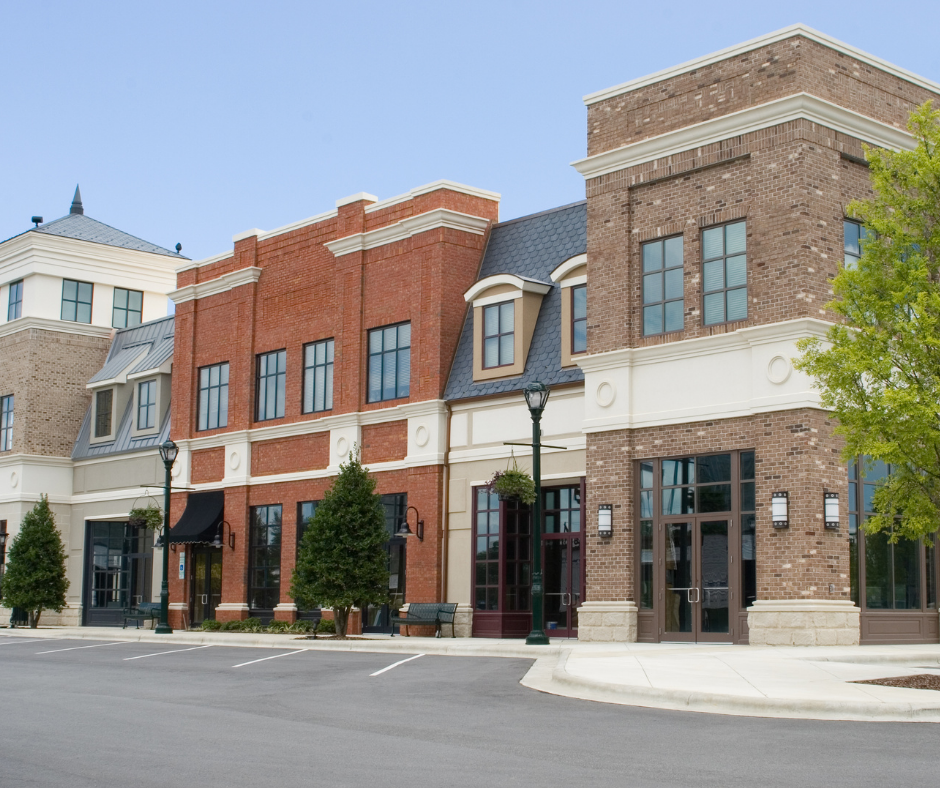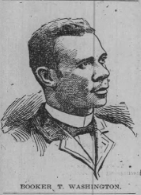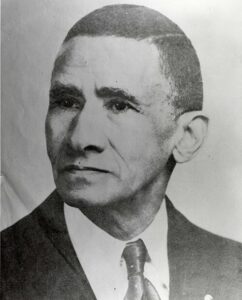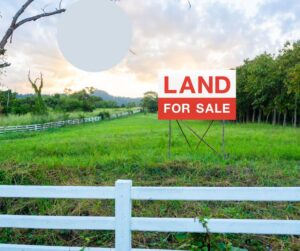Once upon a time in Black Entrepreneur History lived an African American man named Leon Howard Sullivan who became a Reverend, author, civil rights activist both in America and South Africa, nationally renowned speaker, real estate mogul and founder of the first shopping center built, owned and managed by African Americans in the United States of America.
Childhood, Education, Pastoring and Civil Rights
Born on October 16, 1922 in Charleston, West Virginia, to parents who split up when he was yet a toddler, leaving him to be raised by his grandmother Carrie.
He registered for the draft at the age of 19 in Potters County, West Virginia. It was recorded that he was 6.5 feet tall 200 pounds according to WWII draft registration papers. So tall in fact that his height, athleticism as well as academics landed him a full scholarship at West Virginia State College. He then went on to study divinity at Union Theological Seminary[1]. He then earned his Masters in Religion at Columbia University.
From there, he became interested in justice and civil rights through the NAACP. He was mentored by a civil rights organizer and later moved to Philadelphia where he would become pastor of Zion Baptist Church.
When he began to pastor at Zion Baptist Church in 1950 in Philadelphia, the congregation grew tremendously, by 10 times, from 600 to 6000 members. It became one of the most famous Black churches in the country as it promoted and taught not only the Word of God but Black self-help concepts through the many items founded by Reverend Sullivan himself. He fought against inequalities in the workplace and founded the Citizens Committee Against Juvenile Delinquency which fought against many injustices in housing, work and more when it came to the Black community[1a].
Sullivan led the selective patronage campaign to which hundreds of other Black people in the community helped launch. The Selective Patronage campaign taught African Americans to never buy where they can’t work. It was this stance that lead to the desegregation of many workplaces, leading to the hiring of over 2000 Black skilled workers.[1b]
In 1970, the church was burned down in what was called a six-alarm blaze that gutted the building and forced 59 children to evacuate a daycare center on the second floor. Sullivan’s words were “Zion Baptist is not destroyed. What’s destroyed is a building. We have faced problems before and we’ll face this one too.”[2]
Rev. Leon Howard Sullivan and Progress Plaza, Black Capitalism & Aerospace
Reverend Leon Howard Sullivan is known for coining the motto “We Help Ourselves” [3]. He also believed that “40 percent of American potential is unused” while going on to say that “we must use it or lose it.” He blamed most of the unemployment found in America on the lack of skill[4].
This was really a fundamental problem in his eyes, therefore he launched an investment plan called the 10-36.
In 1964, Sullivan used the 10-36 investment method to gain capital to purchase at apartment building. Using the 10-36 method, 600 Black men and women joined his 10-36 plan to buy an apartment complex by investing $10 per month for 3 years, or 36 months, until there was enough money saved to launch the real estate project. With this type of 10-36 investment, they were able to buy an apartment building complex which they named Zion Gardens – the first complex owned and operated by African Americans in the city of Philadelphia.
From there, Sullivan had the desire to push for Black entrepreneurship, so in 1967, he and the other Black property owners of Zion Gardens founded the multi-million dollar Progress Plaza shopping center, complete with a grocery store. All the businesses in the Progress Plaza were Black owned. The fact that it provided the Black community with a grocery store, among other Black owned retailers, kept the money from leaving the Black community, thus pushing for self sufficiency in a country that mistreated them so badly economically.
There was a full write up in the Lebanon Daily News of Lebanon, Pennsylvania in the year of 1968 that spoke of all Leon Sullivan was doing. In fact, the article was titled Negro Capitalists Forge Ahead. Sullivan and people with an entrepreneurial spirit like him were termed Black Capitalists. This term and way of building in the Black community had the support of aspiring president Richard Nixon, those the article classified as “Negro militants on the Left” and the Ripon society in the middle.
It was Leon Howard Sullivan who broke through in Black Capitalism at that particular time in history when he founded the Progress Aerospace Enterprises, Inc, also known as PAE. It was the very first African American owned aerospace company which was a very different type of business than the normal businesses founded by Black people such as salons, grocery stores, educational facilities and barbershops. Sullivan’s aerospace company, which was owned by more than 600 Black investors using the 10-36 investment method he developed, reached where no Black person in America had reached before – to manufacture “both classified and non-classified components for the air space industry”[5a].
PAE was backed and fully supported by General Electric because they believed that Sullivan could do it, awarding him over $2 million while the US Department of Labor awarded him half a million dollars to train and employ 100 full time workers in the factory, and it ended up employing 160 people[5b].
Another idea was developed by Sullivan called Opportunities Industrialization Center, or OIC, in 1964 which he founded that trained Black people for entrepreneurship because Sullivan believed that Black people didn’t just need to work, but they needed to own businesses and the flow of capital.[5c]
Sullivan’s code and style of business became known as Sullivan Principles in the 1970s [6]. What the Sullivan Principles encompassed had to do with racial non-segregation on the work floor, restrooms, and cooking facilities, training for Black and brown people in order for them to gain advancement as well as promoting nonwhites to supervisor positions, equal pay, along with equal schooling, housing and healthcare.
He also became the first African American board member at General Motors Corp. in 1971. His whole reason for taking the position was to “help General Motors, Black people and America” and in no order of preference, according to the Indiana Evening Gazette in 1971 .
Reverend Leon Sullivan’s Dismantling of Apartheid in South Africa
In 1974, Reverend Leon Sullivan had a horrible degrading incident in South Africa where he was told to strip down to his underwear before boarding the airplane back to the USA. The only reason he was told to strip was because he was a Black man. Therefore, he knew what he had to do – become part of dismantling the apartheid system when he got back to the USA.
By 1984 because he was on the board of General Motors, persuaded all American companies to abide by his Sullivan Principles while in South Africa and campaign against apartheid in society and workforce[7]. His work helped to dismantle the apartheid system in South Africa which legally ended in 1990.
Author

Reverend Leon Howard Sullivan wrote a book in 1969 titled Build, Brother, Build: From Poverty to Economic Power.
Marriage
Leon Howard Sullivan married Grace A. Banks in 1944 in Philadelphia, Pennsylvania[8]. They had a daughter named Hope Sullivan (Rose)[10]
Death
Reverend Leon Sullivan passed away on April 24, 2001 in Scottsdale Arizona and was buried in Greenwood Memory Lawn Cemetery in Phoenix, Arizona.
He passed way of leukemia at the age of 78.
Awards and Honors
Life Magazine named him as “one of the 100 Outstanding Young Adults in the United States” (1963) [11].
Sources
[1(a-b)]Sullivan Progress Plaza
[2]Simpson’s Leader-Times (Kittanning, Pennsylvania, 1970, November, 14
[3]New Castle News (New Castle, Pennsylvania) 1971 October 28
[4]Sunday Gazette-Mail (Charleston, West Virginia)1976 October 10
[5(a-c)]Lebanon Daily News (Lebanon, Pennsylvania) 1968 July 31 page 4
[6] The Courier-News (Bridgewater, New Jersey) 27 Apr 2001, Fri Page 19
[7]https://www.nytimes.com/2001/04/26/world/leon-sullivan-78-dies-fought-apartheid.html
[8]Ancestry.com. U.S., Public Records Index, 1950-1993, Volume 1 [database on-line]. Lehi, UT, USA: Ancestry.com Operations, Inc., 2010.
[9]Ancestry.com. U.S., Find A Grave Index, 1600s-Current [database on-line]. Provo, UT, USA: Ancestry.com Operations, Inc., 2012.
[10]The Courier-News (Bridgewater, New Jersey) 27 Apr 2001, Fri Page 19
[11]Delaware County Daily Times (Chester, Pennsylvania) 1967 October 28
Indiana Evening Gazette (Indiana, Pennsylvania)1971 April 12
The National Archives in St. Louis, Missouri; St. Louis, Missouri; WWII Draft Registration Cards for West Virginia, 10/16/1940-03/31/1947; Record Group: Records of the Selective Service System, 147; Box: 477





More Related Stories
Isaac Scott Hathaway – Founder of Isaac Hathaway Art Company & Designer of First African American Coin
James Wormley – Founder of the Most Expensive Hotel in Washington D.C. in 1800s – the Wormley Hotel
William E. Matthews – Wealthy Financial Broker & Civil Rights Leader of 1800s